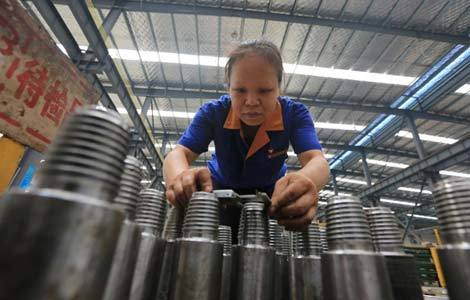The jarring sounds of heavy metals
Updated: 2013-07-16 07:15
By Dong Fangyu (China Daily)
|
||||||||
A joke that has gone viral online goes something like this: An air passenger is forced to take off all his clothes but still sets off an alarm while walking through a metal detector at a foreign airport. At first, the security personnel are puzzled, but then they realize that passenger is from China and thus has an unusually high concentration of heavy metals in his body. The joke reflects Chinese people's frustration with environmental pollution and the health risks it poses.
In fact, there is enough scientific evidence - as highlighted by many netizens - to show that Chinese people are indeed part of a "heavy metal band". For instance, the New York Health Examination and Nutrition Survey reveals that immigrants from the Chinese mainland have "higher blood levels of lead, cadmium, and mercury than either reference group". The report published in the Journal of Immigrant & Refugee Studies also says that the high level of heavy metals in Chinese immigrants is probably associated with their diets, that is, the contaminated food they eat.
While the US report may not be applicable to people across the Chinese mainland, illegal dumping of untreated industrial effluents and the high concentration of heavy metals in some food products have indeed become public health hazards.
Earlier this month, a study found excessive amounts of thallium and cadmium, both carcinogenic heavy metals, in a section of the Hejiang River in Guangdong province, which is the source of drinking water for 30,000 people of Fengkai county. The sources of the contaminants, mining companies in the upper reaches of the river, were reportedly shut down.
The discovery of cadmium-tainted rice from Hunan province has prompted many people to shun the staple from China's top rice-growing province. About 28,000 hectares, or about 13 percent of paddy land, in Hunan is contaminated by heavy metals, according to official estimates. As a result, the sale of Hunan rice has plummeted and many rice mills in the province have closed down, rendering many people jobless.
Unfortunately, soil contamination is not a problem unique to Hunan. It is a problem facing the entire country. The Ministry of Land and Resources once said that every year about 12 million tons of grain - enough to feed more than 40 million people for one year - is contaminated with heavy metals. It also said that contaminated grain causes a direct economic loss of more than 20 billion yuan ($3.26 billion) a year.
The Ministry of Environmental Protection and Ministry of Land and Resources started a nationwide study on soil pollution in 2006 and have compiled a huge database of soil samples. However, the five-year national survey, which cost 1 billion yuan, has not been made public despite a Beijing lawyer's plea to disclose it in the interest of the people.
Given the severity and "secrecy" of heavy metal pollution, people are getting increasingly cautious about what they eat and drink. They fear that toxic effluents from industries are seeping into the soil and underground water table in many places in China.
Unlike smog and particulate matter that can be seen and readily felt, soil and water contamination has escaped public attention. Nevertheless, it has been threatening the safety of crops, drinking water, animals and plants for years, and thus putting humans, who are at the top of the food chain, at risk. Yet the public remains unaware of the real situation.
The good news is that the severity of the problem and repeated public enquiries prompted the Ministry of Land and Resources to announce in June that a detailed "nationwide pollution map" is being drawn up to gauge to what extent has soil been contaminated by heavy metals.
The detailed pollution map, however, should be accompanied by a thorough investigation to identify the sources of heavy metal pollution and determine whether local authorities are colluding with the industrial and mining sectors to conceal the real impact of soil and water contamination on the environment in their pursuit of economic gains.
For example, even after shoals of dead fish were found floating in the Hejiang River from July 1 to 5, the local environmental authorities did not detect the problem because they had "limited detection means". That dangerous chemicals had caused the death of the fish was known only after a higher environmental protection bureau launched a probe. Such delay and negligence could prove very costly.
Since the process of decontaminating soil is very expensive and could take years to execute, it is all the more important to prevent heavy metal-laced industrial wastes from flowing into rivers and lakes or being dumped on land without being properly treated.
Authorities at all levels have to work together to set up a comprehensive supervision and detection mechanism for heavy metal pollution, instead of waiting for a major environmental disaster before swinging into temporary action. Besides, it is the social responsibility of the authorities to inform the public of the level of soil and water pollution in time.
The author is a reporter with China Daily.
E-mail: dongfangyu@chinadaily.com.cn.
(China Daily USA 07/16/2013 page12)

 Obama urges restraint amid protests
Obama urges restraint amid protests
 Putin wants Snowden to go, but asylum not ruled out
Putin wants Snowden to go, but asylum not ruled out
 Apple to probe death of Chinese using charging iPhone
Apple to probe death of Chinese using charging iPhone
 Investment falters as industrial activity flags
Investment falters as industrial activity flags
 Rape victim's mother wins appeal
Rape victim's mother wins appeal
 Reproduction of 'Sunflowers' displayed in HK
Reproduction of 'Sunflowers' displayed in HK
 Land Rover enthusiasts tour the world
Land Rover enthusiasts tour the world
 US star sprinter fails drug test
US star sprinter fails drug test
Most Viewed
Editor's Picks

|

|

|

|

|

|
Today's Top News
Spain apologizes to Bolivia for plane delay
International cotton contract in the works
Smithfield shareholder still presses for break up
China calls for new talks on Iran nuclear issue
Global warming may largely raises sea level
Putin wants Snowden to go, asylum not ruled out
US: China can balance own growth
Top foreign study destinations for Chinese
US Weekly

|

|






